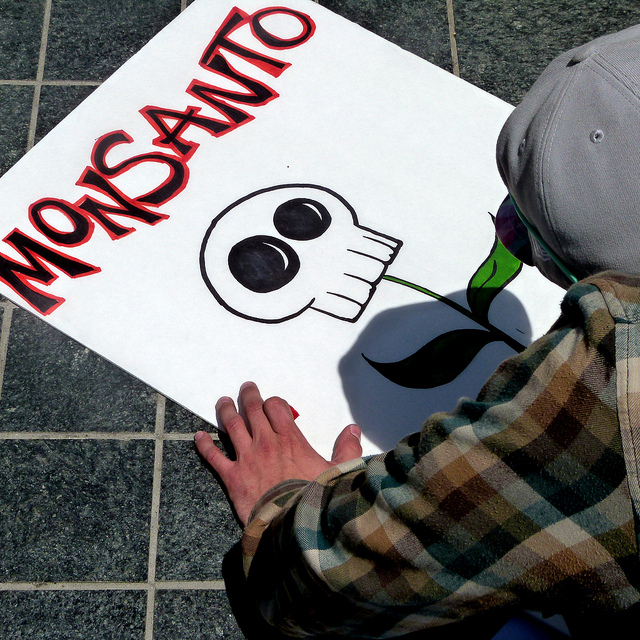
Genetically Modified Organisms (GMO) have been at the center of a heated debate since their introduction in the United States in 1994. Today, the controversial foods represent 70-80 percent of American’s food products.
Despite the concern surrounding the safety of GMO foods, the public is regularly informed that the products are safe to consume. Politicians, scientists, and the media are the general public’s beacons for information and news.
In light of this fact, it is important to highlight the hypocritical motives of US politicians when looking at the safety of GMOs. Former Secretary of State Hillary Clinton, has voiced varying views on the controversial topic of GMOs. Although Clinton has expressed support for GMO labeling, her ties with chemical companies such as Monsanto and Dow Chemical Company.

At a biotech industry conference in San Diego last year, Clinton gave a paid speech in support of GMOs, and even advised executives and investors on how to makes the public more accepting of the process.
“‘Genetically modified’ sounds Frankensteinish. ‘Drought-resistant’ sounds like something you’d want,” she said. “Be more careful so you don’t raise that red flag immediately.”
Despite her support of GMO foods, former White House Chef Walter Scheib revealed the former Secretary of State prefers to dine on organic produce. One report claims the Clinton family, including husband Bill Clinton, “dined regularly on organic foods including Wagyu and grass-fed beef.” In addition, Scheib has also stated that George W. Bush’s family decided to follow a similar diet.
Unfortunately, this demonstrated hypocrisy is not limited to the Clinton family. Earlier this year, President Obama signed a law that would require all food labels to declare whether the item contains genetically modified ingredients. On the surface, the passing of the law seems to fulfil the GMO labeling promises made during the Obama presidential campaign back in 2007. However, the newly passed law was met with criticism and discrimination claims.
Under the new law, companies are required to label GMO ingredients by either declaring GMO ingredients in plain writing on the packaging, providing a QR code, 1-800 number, or website for consumers to use for research.
While the bill does, technically, fulfil his original promise, advocates are arguing that the law discriminates against those who are unable to use smartphones or computers to learn about the contents of their food.
In comparison, the Obama family are known to live on a healthy diet that includes organic produce from the globally recognized White House garden. The vegetable garden, which is recognized as a symbol of local food, has become a small passion project for first lady Michelle Obama. In 2010, with the launch her signature childhood obesity campaign Let’s Move!, the first lady has been working to solve the epidemic of childhood obesity within a generation.
In case you are still uncertain about the logistics of the debate, GMO refers to organisms – typically crops – that has had its DNA altered through genetic engineering. The first genetically modified food crop was Calgene’s Flavr Savr tomato, which had been altered to increase the firmness and shelf life of the Flavr Savr tomato. The GM tomato was approved for commercial production by the U.S. Department of Agriculture in 1992.
This process was then used to modify crops to resist herbicides, increase yield and nutritional value. Despite the claims made by leading chemical companies, academic and industry research shows that there is little evidence to suggest GM crops have resulted in yearly increases in on-farm crop yields in the United States.

Meanwhile, since the introduction of GM crops in the US, herbicide use has grown more than a fifth. Increased use of herbicides has resulted in the creation of superweeds, which are causing farmers to increase the use of pesticides – herbicides and insecticides – on their crops. Pesticides have been linked to a number of pressing environmental concerns, including the rapidly declining populations of vital pollinators.
While it is argued that GMO foods are our only hope of adequately feeding the ever increasing global population, the Union for Concerned Scientists, a nonprofit advocacy group based in Cambridge, Massachusetts, firmly believes organic farming is a better long-term solution to some of the biggest problems facing our planet.
“Research has shown that agroecologically based methods—such as organic fertilizers, crop rotation and cover crops—can succeed in meeting our food needs while avoiding the harmful impacts of industrial agriculture,” argues the Union for Concerned Scientists. “As farmers incorporate these practices into their work, many benefits emerge: Less pollution. Healthier, more fertile soil that is less vulnerable to drought and flooding. A lighter impact on surrounding ecosystems, resulting in greater biodiversity. Reduced
Image: Flickr, Brett Weinstein (CC BY-SA 2.0)
You want to support Anonymous Independent & Investigative News? Please, follow us on Twitter: Follow @AnonymousNewsHQ
This Article (These US Politicians Support GMOs Yet Dine On Organic At Home) is a free and open source. You have permission to republish this article under a Creative Commons license with attribution to the author and AnonHQ.com.




